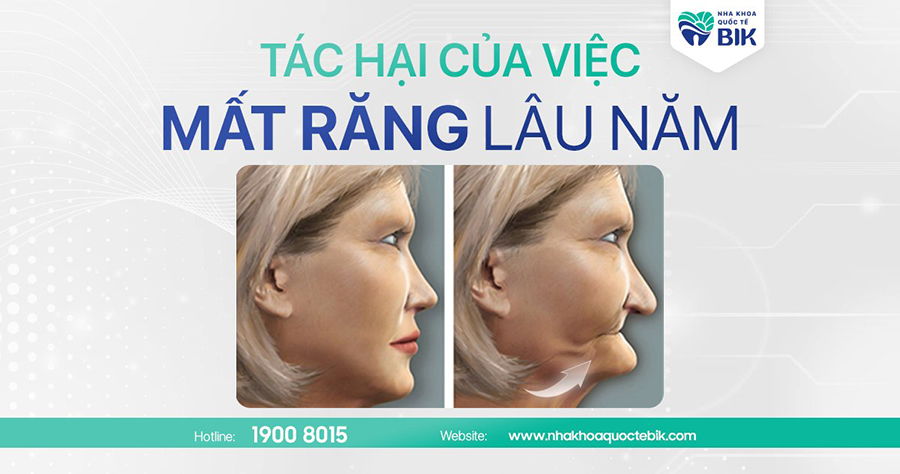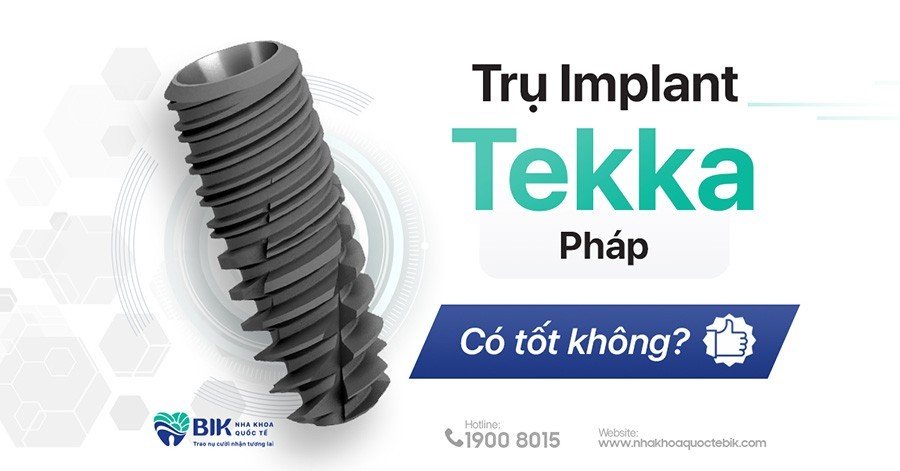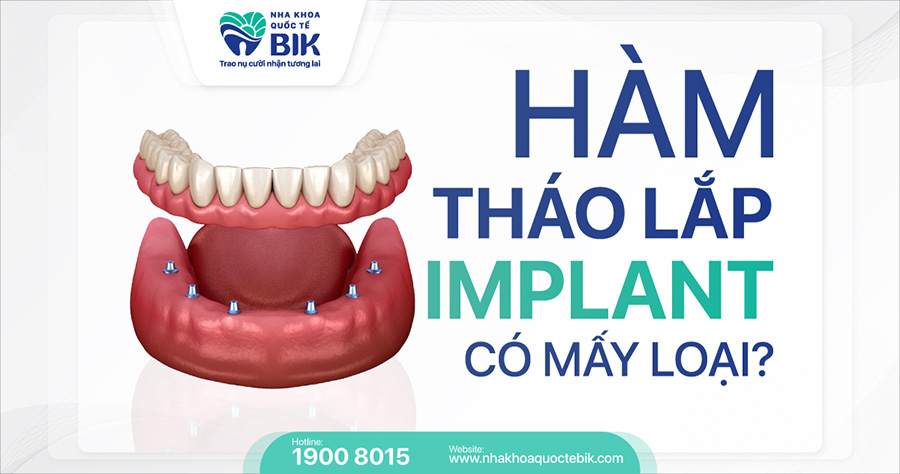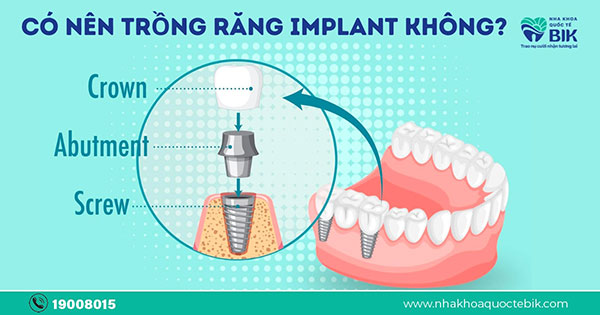
Implantation is a complex dental technique that requires many factors to bring success to dental implants. Many people wonder what are the side effects of dental implants? Let’s find out with BIK International Dentistry!
1. Is dental implant dangerous?
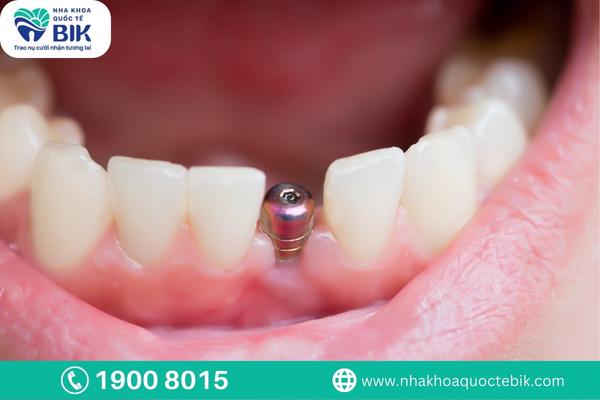
The nature of dental implant is to place an artificial titanium pillar into the jawbone to replace the lost tooth root. This is the only tooth restoration method that requires surgery, so it requires high technique and precision. After waiting for the implant pillar to fully integrate with the jawbone, a porcelain crown will be attached to perform the function of the tooth body through the abutment joint.
The implant pillar is made of Titanium material that is safe for the body and has high biocompatibility in the oral cavity, so it will not cause any side effects or dangers after dental implantation. If you choose a reputable dental facility and take proper care of your teeth, dental implants can last for decades, even a lifetime. Therefore, you can be completely assured about chewing and aesthetics when getting dental implants.
In addition, dental implants also bring many other advantages such as:
Overcoming the situation of losing 1 tooth, many teeth or the entire jaw.
Restore and limit bone loss.
The implant is only placed in the position of the missing tooth, it can stand firmly like a normal tooth root so it does not affect the adjacent teeth.
Once the implant is completely integrated into the jawbone, it can last a long time, and the case of implant rejection rarely occurs.
2. What are the side effects of dental implants?
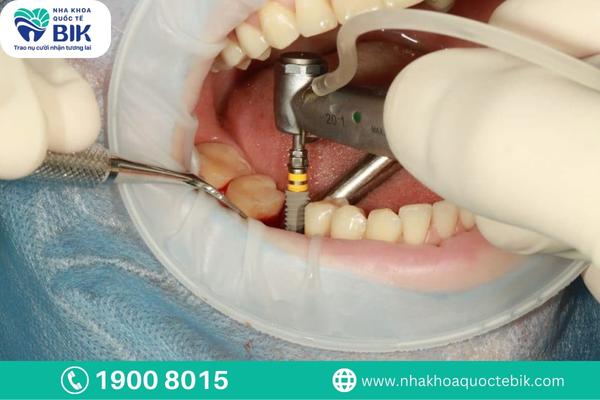
Millions of people around the world have trusted and chosen dental implants to restore their tooth loss. Although it brings many advantages, there can still be unwanted side effects caused by dental implants.
Allergy to the implant: Patients may be allergic to Titanium – the metal used in the implant material. Although Titanium has been studied to be biocompatible with the body, there are still cases where the body cannot adapt and is soon eliminated as a foreign allergen.
Infection in the implant area: Patients do not follow the doctor’s instructions after implant placement; Not cleaning your teeth properly can easily lead to infection. This causes the tissues around the implant area to swell and turn red. If not treated promptly, it can cause serious consequences such as bone loss around the implant, loosening of the implant, etc. In addition, if the sterile stitches during implant placement are not performed properly, the risk of infection after surgery will be very high.
Peri-implantitis: As mentioned above, oral hygiene after implantation must be ensured properly and regularly. The cause of peri-implantitis is due to the patient’s incorrect oral hygiene and care. This condition will gradually lead to infection, bone loss around the implant and make the implant no longer stable in the jawbone.
Incorrect implant placement: Incorrect implant placement will cause the porcelain restoration on the implant to not be close and tight, causing food to get stuck. In addition, if the implant size is not determined correctly, causing the implant to press on the nerve, it can cause prolonged numbness of the lips and nerve damage.
Jaw bone damage: In cases where bone density and bone size are not of sufficient quality to perform dental implants, but the treating doctor does not graft bone but still performs implant surgery, it can easily cause jaw bone fracture, affecting health.
3. Why does dental implant surgery cause swelling?
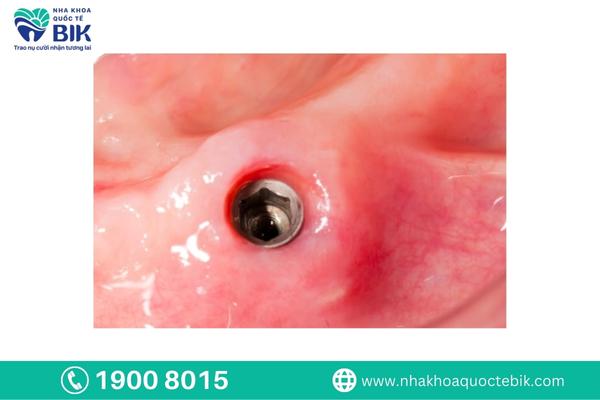
3.1 Swelling and inflammation after dental implant placement
Dental implant placement is the most effective, safe and sustainable method of restoring lost teeth today. During the implantation process, the patient will be assigned surgery to place the implant directly into the jawbone, which will also affect the tissue. Therefore, swelling is quite normal.
Swelling after implant placement usually lasts for about 4-7 days. Especially in the first 24 hours, swelling will appear most on the face where the implant is located, it will gradually decrease and improve in the following days.
Especially for older customers, with poorer health and gum tissue that is no longer elastic, it is easy to have facial swelling. However, the amount of swelling after implant placement depends on each person’s constitution. Therefore, many cases of customers after implant surgery do not experience facial swelling at all, and their chewing and daily activities still take place normally.
Therefore, if the implant surgery is performed by a team of skilled and experienced doctors and modern technology and techniques are applied, all surgical operations will be optimally controlled. This will minimize unnecessary impacts on bone tissue and gums, help reduce swelling and pain and prevent the risk of complications.
3.2 Causes of inflammation after dental implant placement

During the recovery process after dental implant placement, if swelling lasts more than 3 weeks and pain occurs, it is very likely that the wound has become infected, usually due to one of the following reasons:
Poor quality implant materials, causing irritation to the bone or tissues near the implant area.
The doctor performing the procedure lacked expertise, experience and skills, leading to a large incision and a large force during the implantation process, thereby affecting the tissue, gums, nerves, bones, teeth, etc.
The implantation process was not performed properly, using dental tools and equipment that were not sterile and thoroughly disinfected. This led to inflammation in the implant area.
After the implantation, the patient did not take care of and clean their teeth properly, which led to the wound becoming inflamed and slow to heal.
4. What other dangerous complications can occur when implanting teeth?
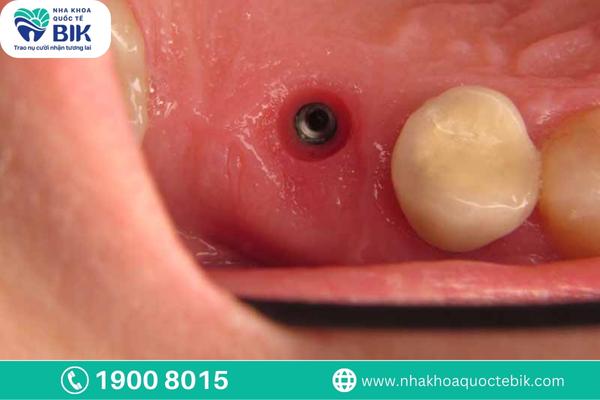
Complications encountered when implanting teeth will bring inconvenience and even danger to the patient’s health. In addition to the above, the following are common complications if the implant is of poor quality and the implant process is not guaranteed:
Prolonged bleeding after surgery: Normally, bleeding after implanting an implant only occurs in the first 1-2 days, bleeding is due to the skin being thin or infected. To stop bleeding, use a clean piece of gauze and bite gently for 30 minutes. However, if the bleeding is heavy and prolonged, it may be one of the complications after implant placement. It is necessary to notify the dentist for timely examination and treatment.
Damage to adjacent tissues: Before performing implant placement, the patient needs to have a general oral health check, a careful CT scan and ensure the doctor’s technique is good. Otherwise, the nerve under the alveolar bone may be damaged during the process of drilling the implant hole, causing the patient to feel pain, numbness or itching in the gums, tongue, and lips. It can also cause damage to the jawbone.
Implant rejection: It occurs due to the inability to establish adhesion between the bone and the implant, there is no bone attachment and fibrous tissue formation between the implant surface.
5. Factors affecting the quality of implant placement?
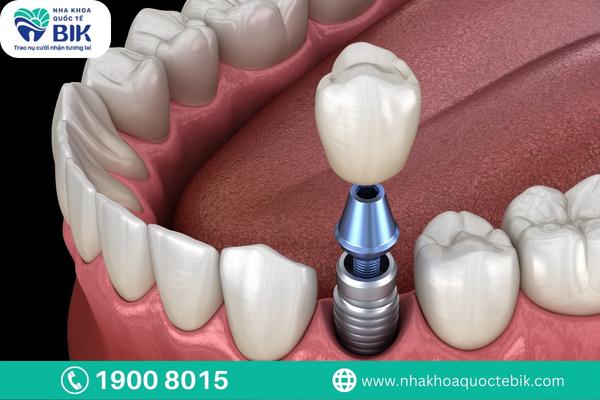
The success of the implant process depends on many factors. If not guaranteed, it will affect the quality of the implant.
Jawbone quality: Jawbone quality is the most important factor in implant treatment. Only with stable bone quality and quantity can the implant be supported and maintained for a long time. Therefore, when the patient has long-term tooth loss and severe bone loss, bone grafting is required before implant placement to ensure long-term effectiveness.
General health of the patient: In case of diabetes, high blood pressure, heart disease, etc., the doctor will examine the level to decide whether the patient can have an implant or not. If dental implants are needed, these diseases need to be treated to avoid health risks. In particular, diseases related to the mouth and teeth also need to be carefully examined before implant placement.
Expertise and skills of the doctor: The doctor must correctly assess the patient’s oral health and general health to be able to provide a reasonable treatment plan. Determine the size, type and number of implants to bring the highest efficiency.
Ensuring sterility during treatment is also one of the important factors, if the sterilization process is not performed well, it can cause the patient to get an infection during and after surgery.
6. Notes to avoid side effects when implanting implants
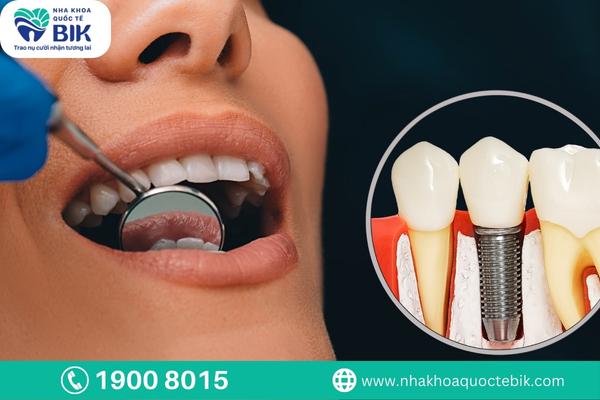
To avoid possible side effects when implanting implants as well as ensuring that the implant performs well after implantation, you need to take some important notes:
Choose a reputable dental facility for dental implants.
Discuss your health status accurately with your doctor to stay safe during surgery.
After implantation, you need to rest, eat properly and follow your doctor’s instructions so that the wound heals faster.
Pay attention to proper oral care and hygiene, avoid touching new wounds.
Re-examination according to the doctor’s appointment, need to take X-ray after implantation to see if the implant is stable in the jaw bone.
If there is any abnormality, contact the dentist immediately for timely examination, do not arbitrarily use medicine or treat the wound.
Re-examination according to the doctor’s appointment, need to take X-ray after implantation to see if the implant is stable in the jaw bone.
7. BIK International Dental Clinic – a reputable dental implant address
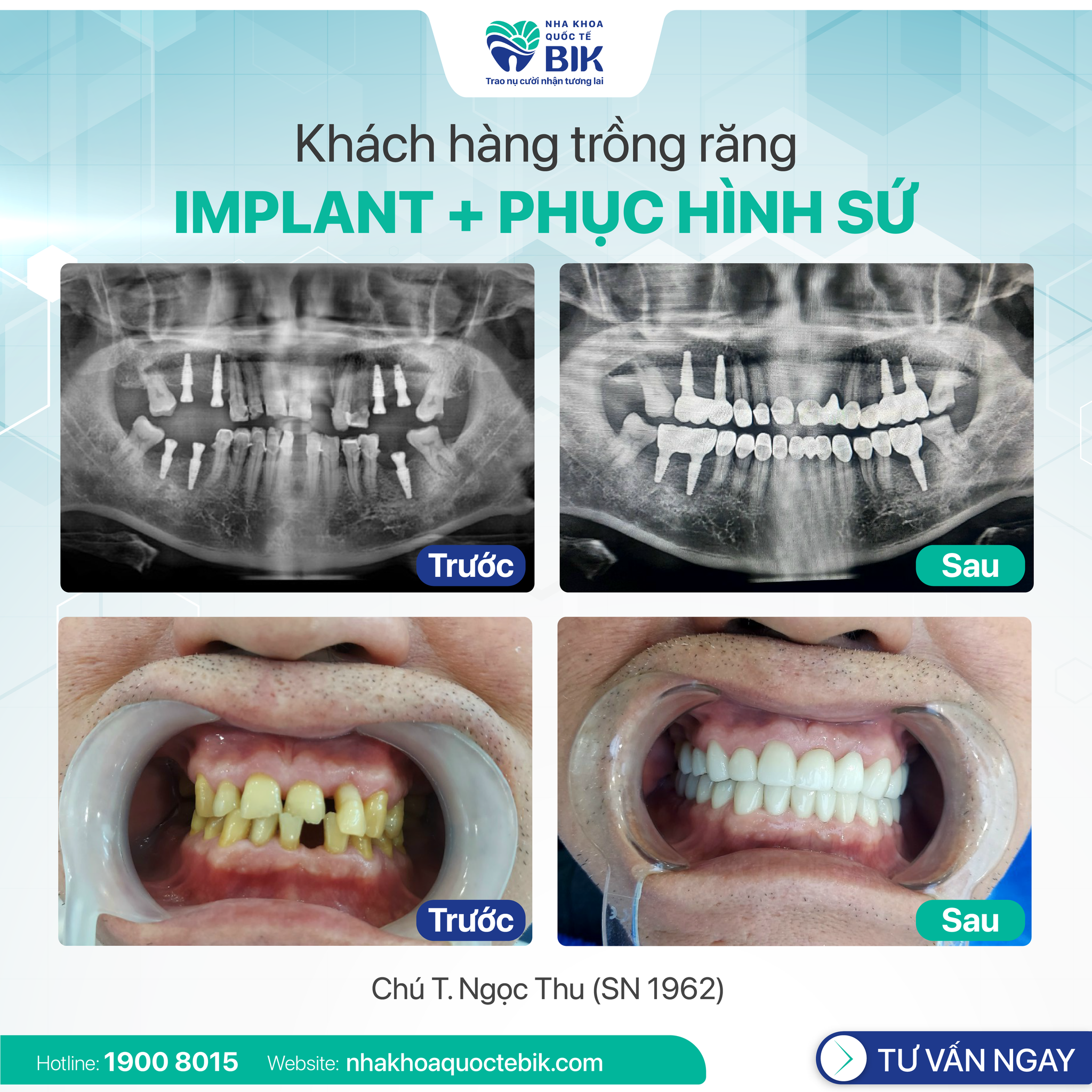
BIK International Dental Clinic is currently an implant dentistry address trusted by many customers in the area to restore tooth loss from cases of losing 1 tooth, many teeth or the entire jaw.
A team of highly qualified doctors with many years of experience, well-trained, provide accurate, safe and effective treatment regimens for patients.
Modern facilities, quality equipment and machinery are invested in, supporting the implant process to take place more quickly and smoothly.
The implant or final porcelain tooth restoration is also guaranteed to be genuine, so customers can be completely assured of the quality of chewing and aesthetics when completed.
Always ensure sterility before and during surgery to avoid infection or danger after implantation.
The patient’s health safety factor is the most important, so reputable dental clinics will be the right choice for customers when they want to treat oral diseases, especially dental implants. So that they do not encounter side effects, dangerous complications or failed dental implants that affect the patient’s health and spirit.





